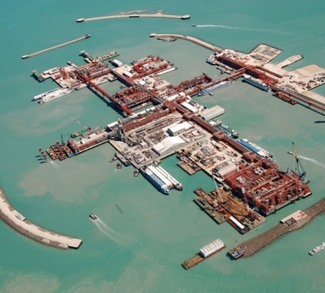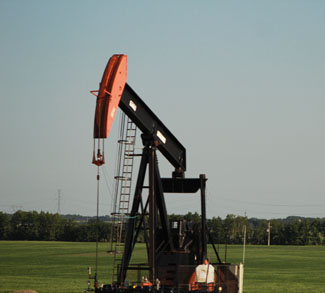FORECAST
The developments around the Trans-Caspian Pipeline project supposed to provide an undersea energy supply link between Turkmenistan and Azerbaijan are about to reach a critical point.
Brussels and Ashgabat are determined to go ahead with the construction regardless of the fact that as of today the Caspian states have failed to reach consensus on the status of the landlocked Caspian Sea, while Moscow and Tehran express opposition to the implementation of any energy transit projects before the existing legal disputes are resolved.
Over the past year, the EU took a series of steps evidently meant to put Russia under greater pressure over the Trans-Caspian pipeline project. In line with the strategy, Brussels threatens to bloc Moscow’s South Stream pipeline project. Last September, German diplomacy chief Guido Westerwelle visited Ashgabat to hold talks with Turkmen president Gurbanguly Berdimuhamedow and to attend the Oil and Gas of Turkmenistan – 2011 international exhibition. Westerwelle’s visit – notably, the first one since the 2006 presidency change in the country – was prepared without publicity and announced only when the German foreign minister was already en route to Turkmenistan. The issues on the negotiating table were deeper EU-Turkmenistan cooperation, the situation in Afghanistan, and the plans for the Nabucco construction. Judging by Westerwelle’s expressions of confidence that the talks over Nabucco would be successful and that Turkmenistan and Azerbaijan would both join the partnership, his mission was to defuse the current discord between the two.
A few days ago, Ashgabat rolled out the results of the second phase of its gas reserves audit which was conducted by Gaffney, Cline & Associates. According to Turkmen vice premier Baymyrat Hojamuhammedov, fresh estimates put the reserves at 71.21b tons vs. the former 44.25b. Roughly a half of the amount is localized within the South Yolotan field, the resource base of the Turkmenistan – Uzbekistan – Kazakhstan – China pipeline inaugurated in 2009. Gaffney, Cline & Associates assess the South Yolotan field as the world’s second-largest with an estimated total of 26.2 trillion cubic meters. The data combined with Turkmenistan’s plan to raise the annual outputs of oil and gas to 67m tons and 220 bcm by 2030 seem to guarantee the task of export route diversification a line on the Turkmen agenda.
Gazprom deputy CEO A. Medvedev called the above estimates into question in a November 18 interview to Russia’s Rossiya 24 state-run TV channel. He said that no serious study had been conducted in Turkmenistan to back the audit results and no research report had been presented, further stressing that the country does have gas fields but they lie in technologically difficult terrains. Medvedev cited the Soviet-era explorations which marked the launch of the Turkmen natural gas industry to explain that a full picture of Turkmenistan’s reserves is no secret to Gazprom. There is certainly a point in Gazprom’s position: Gaffney, Cline & Associates released bottom-line estimates with no in-depth study report, making their credibility impossible to gauge.
On November 19, Turkmenistan’s foreign ministry lashed out at Gazprom in response, calling Medvedev’s statement unethical and disrespectful to the country which remains a key partner in the energy sphere for Russia. Ashgabat charged that Medvedev deliberately gave a distorted description of the situation with the Turkmen natural resources and the Russian media increasingly attacked Turkmenistan over its “independent energy policies”. Moreover, the Turkmen foreign ministry voiced a projection that the South Yolotan field may prove to contain more than 26.2 trillion cubic meters on natural gas as the north-western, south-eastern, and western borders of the deposit site are yet to be defined. Based on the recent audit results, on November 18 the Turkmen president issued a decree by which the South Yolotan – Osman field was bracketed with several others located nearby under the title Galkynysh.
As a parallel process, Ashgabat is pouring increasing efforts into its east-bound energy policy. President Berdimuhamedow toured Beijing on November 22-25 and penned 14 energy deals, the main one being to add 25 bcm to Turkmenistan’s annual export of natural gas to China. At the moment, the export targets for mid-2012 and 2015 are 30 bcm and 65 bcm respectively. Uzbekistan and Kazakhstan similarly plan to supply 10 bcm and 12-15 bcm of natural gas to China. For Turkmenistan, the gas contracts with China are evidence of success of its export diversification policies which should prompt Russia and the EU to compete over the Turkmen energy resources.
It somehow evaded the media that the money for the field exploration and pipeline construction in Turkmenistan was borrowed from China. Under the arrangement, Turkmenistan has to supply gas to China at discount prices, and the revenues drawn from the country cannot offset Turkmenistan’s losses incurred in gas transactions with Russia.
The expansion of gas supplies from Turkmenistan to China essentially puts obstacles in the way of the Trans-Caspian pipeline project as the question arises whether Ashgabat has sufficient resources to feed to all of its export avenues. For the EU, the rivalry with China, the country about to become the top-buyer of natural gas from Turkmenistan, looms on the horizon in any case. Azerbaijan, a Trans-Caspian project partner, is not as keenly interested in having the pipeline constructed since the Azerbaijani supplies via the Baku – Tbilisi – Erzurum pipeline to Turkey would be exposed to extra competition when the Turkmen gas starts to reach the country. Due to the reason, the diplomacies of the Nabucco partners are pushing Baku and Ashgabat to overcome their current disagreements. Finally, it is unclear how Turkmenistan and its partners are going to construct the Trans-Caspian pipeline absent a compromise on the legal status of the Caspian Sea. Neither Russia nor Iran would tolerate infringements upon their interests in the Caspian region, while Kazakhstan whose own gas reserves are modest maintains neutrality in the dispute.
An escalation is imminent if drastic steps to advance the construction of the Trans-Caspian pipeline are taken. The US, which at the moment intends to shift some of its military infrastructures from Afghanistan to Central Asia, will likely intervene in the conflict.



